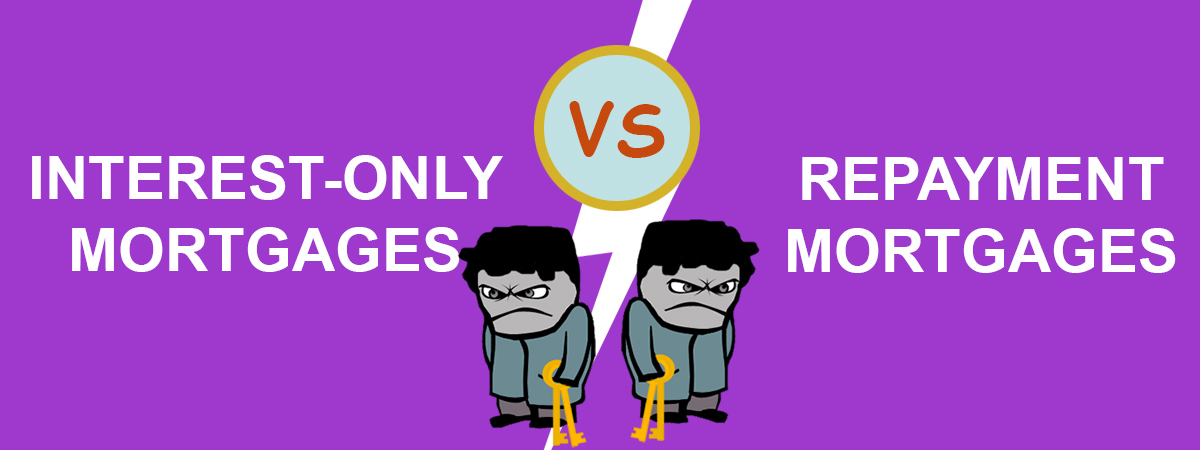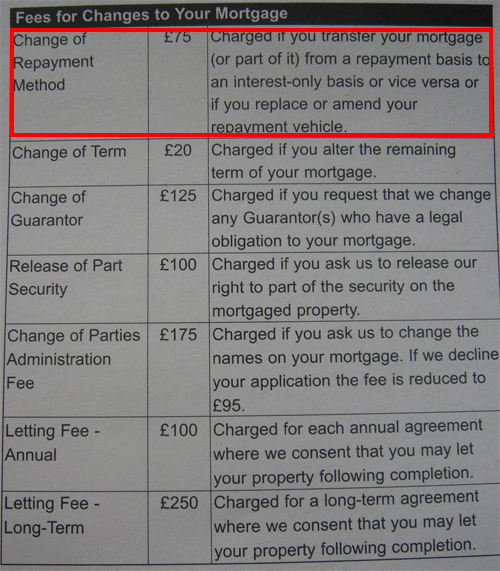
There are generally two means of paying your mortgage back to your lender, Repayment and Interest-only.
It’s critical to know the difference when choosing a mortgage policy; both have their advantages and disadvantages, and one method will probably suit you better than the other. Let’s find out which is which (before you make a God awful balls-up)…
Repayment Mortgage
With a repayment mortgage your monthly payments goes towards both the mortgage debt as well as paying the interest on the loan.
The amount you pay each month is calculated so that you pay off the full amount owed by the end of the mortgage term (most commonly 25yrs). So, in theory, if you stick to every payment for the duration of the mortgage term, then your mortgage should be paid off at the end of it.
Ultimately, you will pay more on a monthly basis for a repayment mortgage compared to an interest-only, because…
Interest-only Mortgage
If your mortgage is on an interest-only payment plan, then your monthly payments will NOT pay off any of the debt, only the interest on the loan. That means the exact amount you borrowed must be repaid at the end of the mortgage term in one lump sum.
Interest-only Vs Repayment Mortgages
Repayment Mortgages
Advantages of repayment mortgages
- You pay less on interest overall – because the debt decreases every month, so actually, towards the later stages of the mortgage term, more of each payment goes towards clearing the balance.
- Access to better rates – generally speaking, borrowers can remortgage to better deals (i.e. mortgages with lower interest rates) if they have more equity in their property. So that means later into the mortgage term, once you have reduced a lot of the debt, you’ll be able to switch to a better mortgage deal.
- You will have no debt and own your home outright – presuming you make all of your payments throughout the term of the mortgage.
Disadvantages of repayment mortgages
- Monthly payments are higher – because you’re paying the mortgage debt as well as paying the interest on the loan each month, the monthly cost will be higher compared to the same mortgage policy but with an interest-only payment plan.
Interest-only Mortgages
Advantages of Interest-only mortgages
- Lower monthly payments because you only have to pay the interest on the loan (and not any of the actual mortgage debt).
- Gives you access to more cash – because your monthly payments are less, it may give you more access to cash (which can be used for other investments).
- Interest-only mortgages tend to be more flexible – most lenders will allow you to optionally reduce the debt (which is known as making overpayments), unlike with repayment mortgages, where paying off the debt is mandatory with each monthly payment.
Overpaying is essentially where a borrower pays off more of the mortgage debt than they contracted to. So, someone with an interest-only mortgage can make regular (or irregular) lump-sum payments towards the capital of the debt (which will also, of course, reduce the monthly mortgage payments since they’ll be paying interest on a smaller debt).
However, the reality is, many borrowers, particularly landlords, never make any form of repayment (i.e. reduce the debt of the mortgage), they just continue paying the interest-only. Why? Because they’re relying on capital growth (i.e. house prices to increase), so when they sell in the future, that’s when they’ll make their money. In the meantime, they can continue making the lower interest-only payments, which gives them access to more cash.
Disadvantages of Interest-only mortgages
- More expensive overall – because you’re only paying the interest of the loan, the amount you owe on the debt will not decrease over the mortgage term. This means that the amount of interest you pay will not go down either (unless you remortgage to a mortgage with a lower interest rate).
- Negative equity – this can be an issue if house prices drop and you have little equity in your property (which is common for borrowers only paying interest). Why?
Imagine you purchased a house for £100k on a 95% mortgage and make no overpayments. Then out of nowhere, the market takes a turn for the worst and house prices dive by 10%. You’re suddenly left with a property worth £90k, but with a debt of £100k. That’s what is known as ‘negative equity‘.
Switching from Repayment to Interest-only mortgage types (or vice versa)
Most mortgage lenders allow borrowers to change between interest-only and repayment methods during an existing policy. For example, if you have an existing mortgage policy that is interest-only, you can change it to repayment and visa versa.
The actual process of switching is pretty straightforward; it’s not like remortgaging. You�’ll still keep your existing policy (same rates), however, your monthly payments will change accordingly.
You should check your terms and conditions or contact your lender’s customer service department just to clarify that you’re within your rights to change the repayment method. However, from my experience, and as said, most lenders will accommodate the change.
Here’s a small extract from my old Northern Rock’s terms and conditions sheet. You should be looking for a clause which mentions the “change of repayment method” (or something to that effect), as highlighted in red:

As you can see, there is a small £75 admin fee (the fee may vary depending on your lender).
Why switch from Interest-only to Repayment?
Many borrowers switch from interest-only to repayment because, whereas they were only paying the interest on their mortgage, they now want to chip away at the debt each month.
Why switch from Repayment to Interest-only?
If the repayment method suddenly becomes too expensive for a borrower, for example, if there is a change in financial circumstances (e.g. drop in salary), then it’s normal for borrowers to switch to interest-only to reduce their monthly payments. Once the borrower gets into a better financial position, they can switch back to the repayment method of paying their mortgage if they wish.
Final points
While interest-only mortgages may sound like the better option because of the flexibility, it’s important to note that it’s not always the safest option, especially for those that lack discipline with their finances.
Remember, with a repayment mortgage the borrower is required to reduce the balance of the debt each month, it isn’t optional, so the borrower will eventually clear their mortgage debt (assuming all the payments are made during the term of the mortgage), or at least reduce the debt. By reducing debt, equity increases – that’s a key point.
Reducing the capital with an interest-only mortgage is optional, so it’s not always done, which can lead to issues like negative equity (as discussed) and limitations when remortgaging.
Disclaimer: I'm just a landlord blogger; I'm 100% not qualified to give legal or financial advice. I'm a doofus. Any information I share is my unqualified opinion, and should never be construed as professional legal or financial advice. You should definitely get advice from a qualified professional for any legal or financial matters. For more information, please read my full disclaimer.


 Landlord Products / Services
Landlord Products / Services



